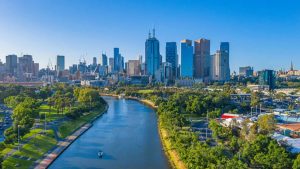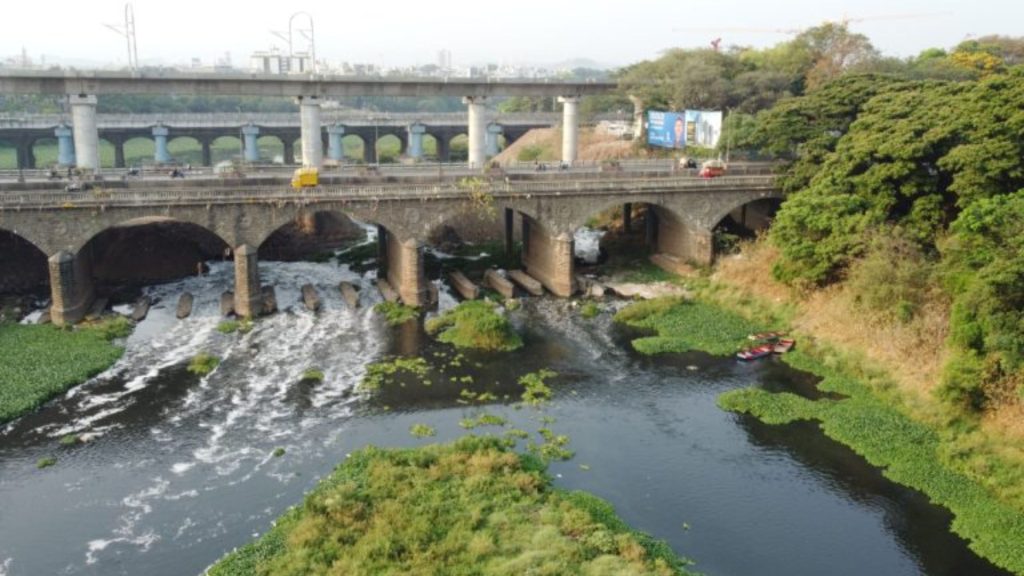
Water Conservation and Management Projects
Water conservation and management projects play an important role in addressing one of the most pressing environmental challenges.
With water scarcity becoming increasingly prevalent in many regions across the globe, including India, the need for sustainable water management practices are becoming very urgent.
India, a country that’s growing quickly with lots of industries and cities, is dealing with a lot of environmental issues. These include things like pollution, using up natural resources too fast, and the impacts of climate change.
Water Crisis in India
In India, the availability, quality, and management of water resources pose significant challenges, impacting millions of lives and the environment.
From urban centers to rural communities, water scarcity, pollution, and inequitable distribution are pressing issues that demand urgent attention and comprehensive solutions.
With a rapidly growing population, increasing industrialization, and changing climatic patterns, the need for effective water management strategies has become more critical than ever.
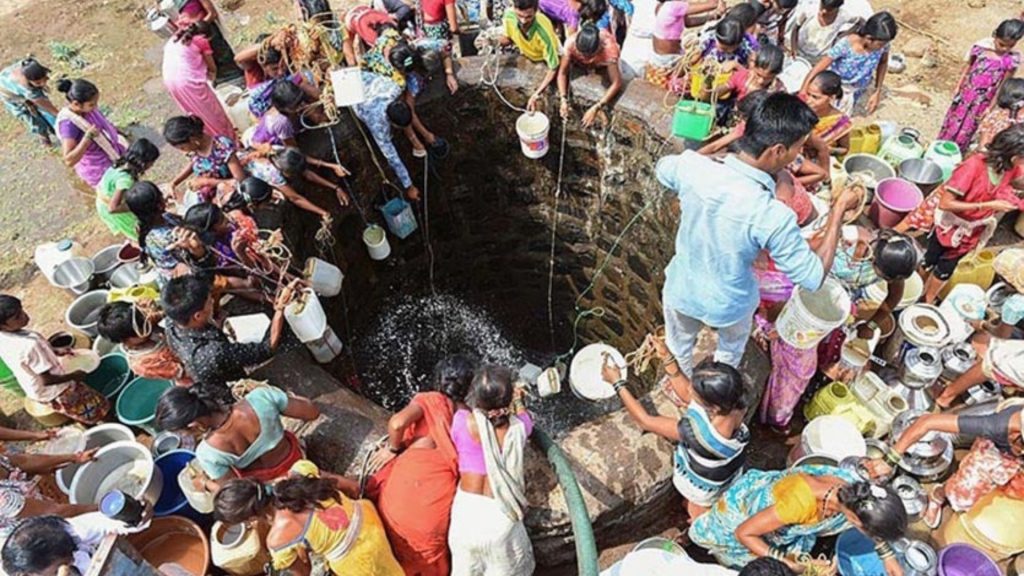
Water Crisis, Rural India
List of Places Facing Severe Water Challenges in India
1.Chennai, Tamil Nadu:
Chennai has been facing severe water scarcity due to depleted groundwater levels, erratic monsoon patterns, and inadequate water management infrastructure. The city relies heavily on groundwater and surface water sources like lakes and reservoirs, which have been heavily polluted and overexploited.
2.Shimla, Himachal Pradesh:
Shimla faces water shortages, especially during the summer months, due to a combination of factors including rapid urbanization, deforestation, and inadequate water supply infrastructure. The city’s main water source, the Shimla Water Catchment Sanctuary, has been under stress due to encroachment and pollution.
3.Latur, Maharashtra:
Latur has experienced acute water scarcity due to recurring droughts, depletion of groundwater levels, and inadequate water management practices. The region heavily relies on rain-fed agriculture, making it vulnerable to water shortages during dry spells.
4.Jaipur, Rajasthan:
Jaipur faces water scarcity due to its arid climate, rapid urbanization, and overexploitation of groundwater resources. The city’s water demand has been increasing rapidly, putting pressure on its limited water sources such as dams, lakes, and groundwater aquifers.
Major Water Crisis in Bangalore,2024
In 2024, Bangalore still faces a big water problem because of fast-growing cities, more people, and not proper water management.
The city faces multiple challenges that have led to a severe shortage of clean and accessible water for its resident
One of the primary issues contributing to the water crisis in Bangalore is the depletion of groundwater resources.
Over-extraction of groundwater for various purposes, including agriculture, industry, and domestic use, has led to declining water levels and increased contamination of aquifers.
The city’s dependence on surface water sources such as lakes and rivers has been hampered by pollution.
Many of Bangalore’s lakes have been heavily polluted due to untreated sewage discharge, industrial effluents, and solid waste dumping, rendering them unfit for human consumption or recreational activities.
Also, unusual rainfall patterns and the effects of climate change have further strained Bangalore’s water supply.
In response to the water crisis, authorities in Bangalore have implemented various measures, including rainwater harvesting initiatives, water conservation campaigns, and infrastructure projects to improve water distribution and treatment.
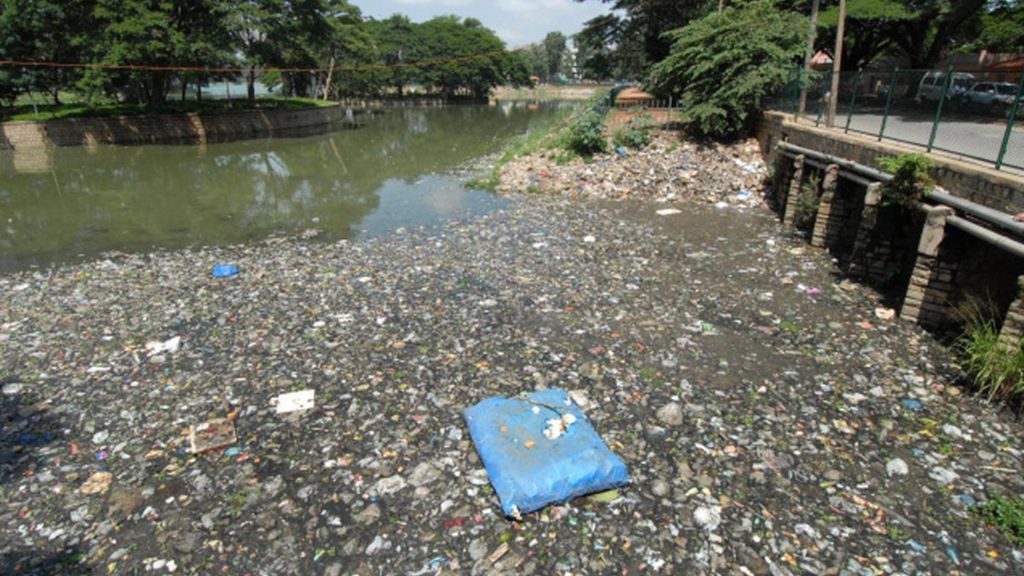
Earth5R initiated a cleanup project at Bellandur Lake in Bangalore.
Conditions of Water Sources in India
1.Pollution Levels
Many lakes and rivers in India are heavily polluted due to industrial discharge, untreated sewage, and agricultural runoff.
According to the Central Pollution Control Board (CPCB), a significant percentage of India’s water bodies are classified as polluted, with levels of pollutants exceeding permissible limits.
2.Ganga River Basin
The Ganga, one of India’s most sacred rivers, suffers from severe pollution, primarily due to untreated sewage and industrial effluents.
Despite various government initiatives such as the Namami Gange program, pollution levels in the Ganga remains high.
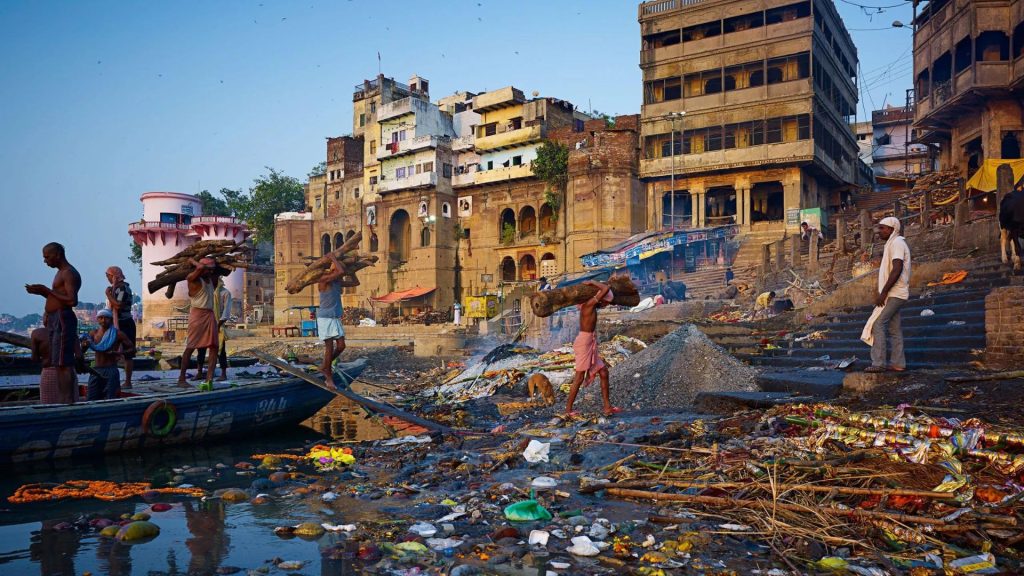
Ganga River Basin, India
3.Yamuna River
The Yamuna River, which flows through Delhi and several other states, is one of the most polluted rivers in India.
Efforts to clean the Yamuna have been largely ineffective, with pollution levels remaining dangerously high, impacting both human health and aquatic ecosystems.
4.Urban Lakes
Many urban lakes across India face pollution and degradation due to encroachment, waste dumping, and eutrophication.
As per the Indian National Lake Conservation Plan (NLCP), a significant percentage of urban lakes are classified as polluted or severely polluted.
5.Depletion of Groundwater
India’s groundwater resources, including aquifers and groundwater-fed lakes and rivers, are under immense pressure due to over-extraction for agriculture, industry, and domestic use.
The depletion of groundwater levels has led to the drying up of rivers and lakes in several regions, increasing water scarcity.
6.Wetland Loss
Wetlands, important ecosystems that provide habitat for diverse flora and fauna, are facing threats from urbanization, pollution, and land-use changes.
Given by the Ramsar Convention, several wetlands in India are at risk of degradation and loss, posing a threat to biodiversity and water security.
7.Water Quality Monitoring
The Government of India, through agencies like the CPCB and state pollution control boards, conducts regular monitoring of water quality in lakes and rivers across the country.
Still, enforcement of environmental regulations and measures to address pollution remain key challenges.
Techniques of Water Conservation
Water conservation includes various techniques aimed at optimizing water use and preserving freshwater resources.
Some key strategies include rainwater harvesting, watershed management, efficient irrigation practices, wastewater treatment and recycling, use of water-efficient appliances, sustainable land use practices, and public awareness and education initiatives.
These techniques help minimize water wastage, enhance groundwater recharge, improve soil health, and reduce pollution.
Rainwater Harvesting For CSR Programs
Rainwater harvesting for Corporate Social Responsibility (CSR) programs involves companies implementing initiatives to conserve and utilize rainwater for the benefit of communities and the environment.
CSR initiatives focusing on rainwater harvesting contribute to sustainable water management, community development, and environmental conservation.
Community Engagement: Companies engage with local communities to identify areas facing water scarcity or where access to clean water is limited. By understanding community needs and priorities, companies can tailor rainwater harvesting projects to address specific challenges and benefit the local population.
Infrastructure Development: CSR programs invest in the development of rainwater harvesting infrastructure, including rooftop harvesting systems, surface water collection structures, and storage facilities such as tanks and reservoirs. These infrastructural developments enable the capture, storage, and utilization of rainwater for various purposes.
Water Security: Rainwater harvesting contributes to enhancing water security in communities by providing an additional source of water for domestic, agricultural, and industrial use. By reducing reliance on groundwater and surface water sources, rainwater harvesting helps mitigate the impacts of water scarcity and drought.
Environmental Conservation: Rainwater harvesting promotes environmental conservation by reducing soil erosion, replenishing groundwater resources, and supporting ecosystem health. Capturing rainwater prevents runoff and allows it to percolate into the ground, replenishing aquifers and maintaining stream flows.
Livelihood Improvement: CSR initiatives focusing on rainwater harvesting can improve livelihoods and economic opportunities for communities, particularly in rural areas. Access to reliable water sources supports agricultural productivity, promotes livestock rearing, and enables small-scale enterprises reliant on water.
Long-term Sustainability: CSR programs ensure the long-term sustainability of rainwater harvesting projects by incorporating community participation, stakeholder engagement, and monitoring mechanisms. Regular maintenance and periodic evaluation of the infrastructure ensure optimal functioning and maximize benefits over time.
Earth5R’s Partnership & Collaborations for Water Management & Conservation
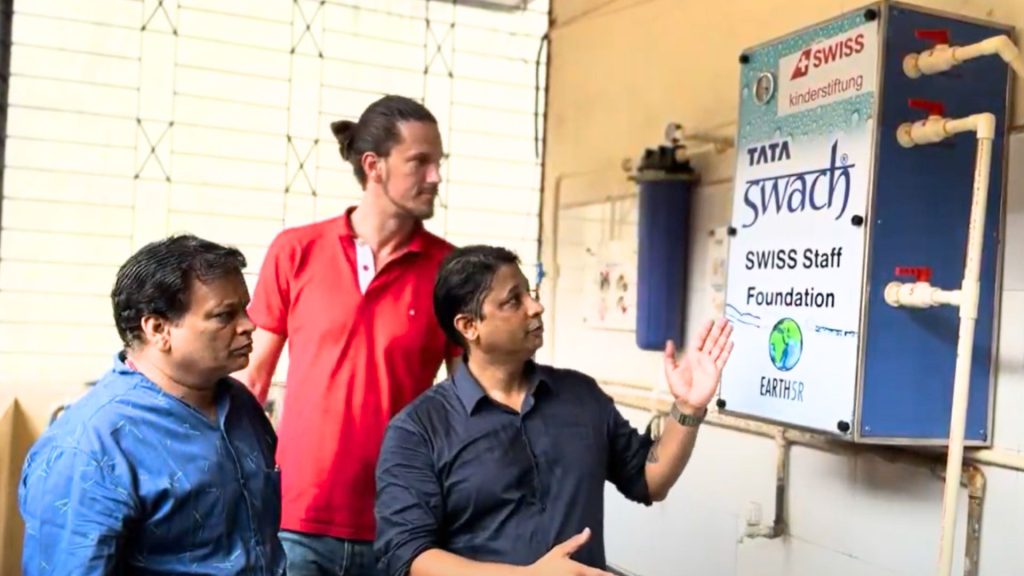
Saurabh Gupta, the Founder of Earth5R, along with the Head of the Municipality School and the Chief of the Swiss International Airlines Staff Foundation, showcased the installation of water filters for school children.
Earth5R has also partnered with the Swiss Water Filter Program to enhance water hygiene and safety in schools.
Through this collaboration, Earth5R is implementing water filtration systems in schools to provide access to clean and safe drinking water for students and staff.
By installing these water filters, Earth5R aims to prevent waterborne diseases and promote better health and hygiene practices among school communities.
This initiative not only contributes to improving water quality but also supports the overall well-being and educational outcomes of students.
Impact Across India
Earth5R’s projects are making a difference all over India.
In Mumbai, Earth5R has implemented rainwater harvesting systems in urban areas to capture and store rainwater for various uses, including groundwater recharge and irrigation.
In Bengaluru, Earth5R has conducted lake cleaning and rejuvenation drives to restore the ecological balance of urban lakes and improve water quality.
In Kerala, we are focusing on protecting coastal areas and mangroves to help communities deal with climate change impacts.
Pollution levels are really high, especially in cities like Delhi, Mumbai, Bangalore, and Chennai. These cities have to deal with a lot of air and water pollution.
Verified data shows that India is one of the biggest contributors to global greenhouse gas emissions, which makes climate change worse.
The country is also losing its natural resources, like forests and water, and this is causing a lot of problems for the environment.
Biodiversity loss, which means losing different types of plants and animals, is making the environmental crisis even worse. All of these issues are making it hard for India to develop in a sustainable way.
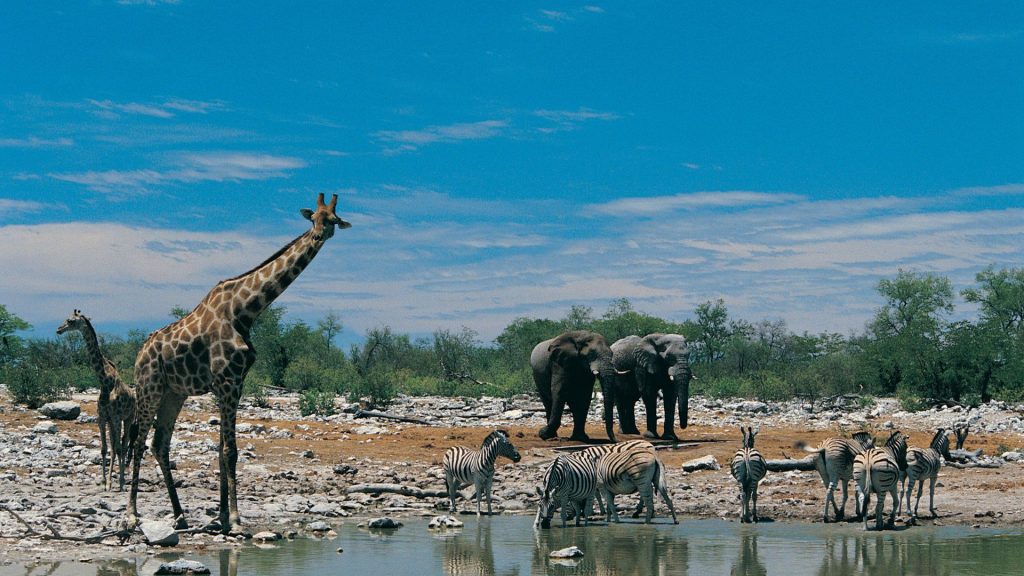
Biodiversity loss has become a global phenomenon affecting ecosystems worldwide.
The Earth5R App
Earth5R is using technology to make a big impact on the environment. The mobile app is at the center of their efforts, making it easy for people to get involved and track their actions.
The Earth5R app allows users to log their sustainability efforts, such as reducing plastic usage or participating in clean-up drives. This helps individuals keep track of their contributions to environmental conservation.
The app also increases community engagement by connecting users with others who care about the environment.
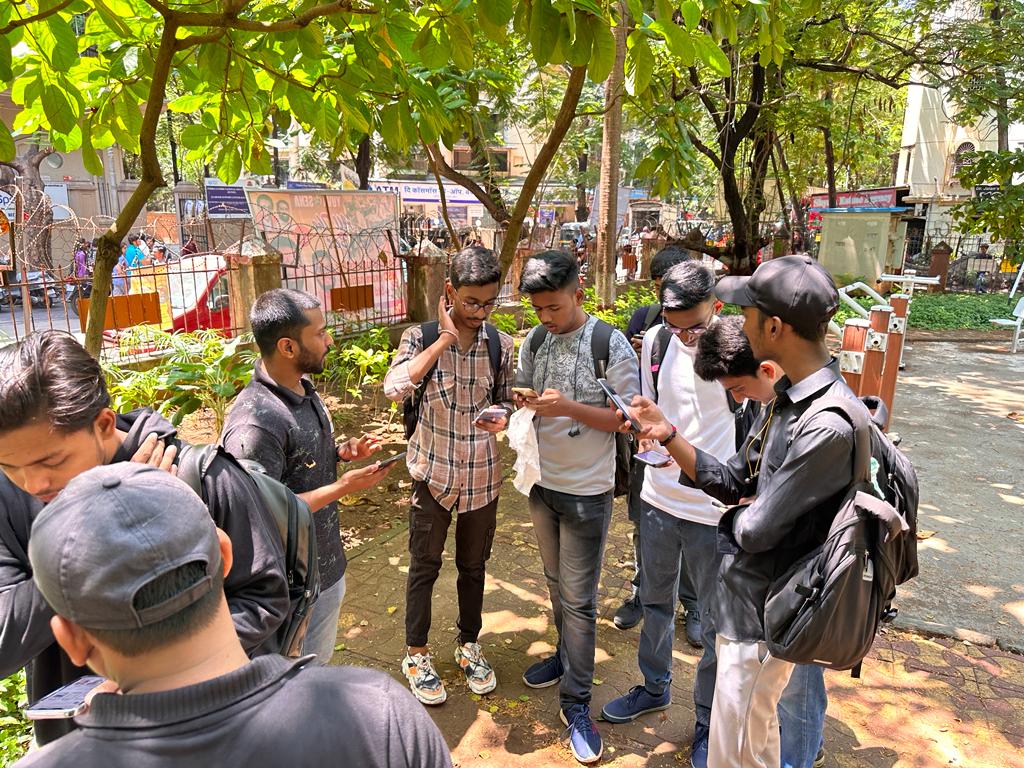
Users can join groups, participate in discussions, and collaborate on projects, creating a sense of community and collective action.
Earth5R’s CSR and ESG programs are all about taking action to make our environment better and help people.




